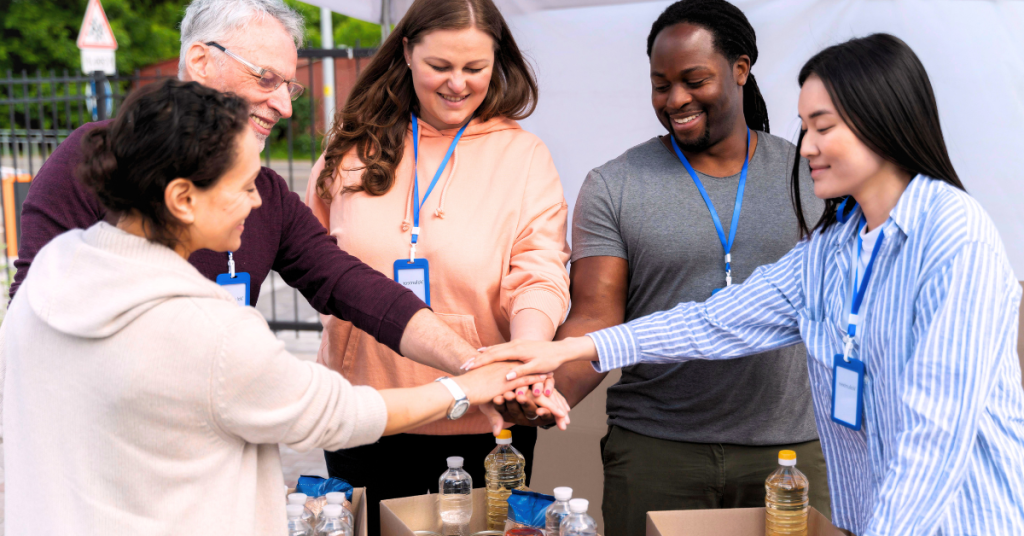In today’s fast-paced world, the concept of giving has evolved from simply helping others to becoming a significant factor in improving one’s own well-being. While the primary focus of charity has traditionally been on aiding those in need, modern research sheds light on how acts of giving can also profoundly benefit the giver. The positive effects of altruism are not just limited to emotional fulfillment but extend to physical health, mental well-being, and even personal growth.

What is the Science Behind Giving?
Numerous studies have shown that giving activates the brain’s reward system. When we engage in acts of kindness, such as donating to a charity or volunteering, the brain releases dopamine and endorphins, which are chemicals associated with happiness and a sense of accomplishment. This natural “high” is often referred to as the “helper’s high” and can have lasting positive effects on our mood and mental health.
Altruistic behavior also engages the prefrontal cortex, the part of the brain associated with decision-making and empathy. By continuously practicing acts of kindness, individuals can strengthen this area of the brain, making them more empathetic and compassionate in everyday life.
The Mental Health Benefits of Charitable Acts
One of the most compelling aspects of giving is its profound impact on mental health. Studies indicate that individuals who engage in regular charitable activities experience lower levels of stress, anxiety, and depression. The act of giving helps to shift the focus from personal worries to the needs of others, fostering a sense of purpose and belonging.
Reduction of Stress and Anxiety
Stress and anxiety are common issues in today’s world, but giving has been found to be a natural antidote to these negative emotions. When we give, we often feel more connected to others, which reduces feelings of isolation—a major contributor to anxiety. In fact, research from the University of California found that individuals who practiced regular acts of kindness experienced a notable reduction in their cortisol levels, a hormone directly associated with stress.
Boost in Happiness and Satisfaction
Numerous studies have shown that people who give regularly—whether through time, money, or resources—report higher levels of happiness and life satisfaction. One study published in the Journal of Social Psychology revealed that individuals who spent money on others reported feeling happier than those who spent it on themselves. This demonstrates that the act of giving inherently produces joy, often exceeding the pleasure derived from self-indulgence.
Physical Health Benefits Linked to Giving
The benefits of giving extend beyond the realm of mental health. There is increasing evidence that altruistic behavior can contribute to improved physical health. Engaging in regular charitable acts can promote longevity, reduce the risk of chronic diseases, and even lower blood pressure.
Lower Blood Pressure and Heart Health
One study published in the International Journal of Psychophysiology found that individuals who gave regularly experienced lower blood pressure than those who did not. The act of giving appears to induce a calming effect on the body, reducing both psychological and physical stressors. Over time, this reduction in stress can contribute to improved heart health and a reduced risk of cardiovascular disease.

Increased Longevity
Research also suggests that altruistic individuals tend to live longer. A study by the University of Michigan found that people who gave support to others, whether through caregiving or monetary donations, had a lower mortality rate than those who did not engage in such activities. The findings suggest that helping others may directly contribute to an individual’s longevity by reducing the physical impacts of stress and promoting a sense of well-being.
Giving Fosters Social Connections
One of the less-discussed but equally important benefits of giving is its ability to foster social connections. When we give, we often build relationships with the recipients of our kindness or with others who share similar charitable goals. These social bonds are crucial for both emotional support and personal growth.
Strengthening Relationships
Whether through donating to a cause, volunteering at a community center, or simply offering emotional support to a friend in need, giving creates opportunities for deeper human connections. These interactions are essential for building a sense of community and belonging, both of which are fundamental for emotional resilience and mental health.
Encouraging a Cycle of Giving
Giving can be contagious. When others see someone engaging in altruistic behavior, they are more likely to follow suit. This cycle of generosity not only enhances the well-being of the giver but also creates a ripple effect that positively impacts entire communities. Collective generosity can transform communities by fostering stronger social ties, increased trust, and a shared sense of responsibility.
Personal Growth Through Giving
Beyond the immediate benefits to mental and physical health, giving can also contribute to personal growth. Altruistic acts challenge us to step outside of our comfort zones, think beyond ourselves, and develop a broader perspective on life.
Building Empathy and Compassion
Engaging in acts of kindness allows us to practice empathy, which is crucial for understanding and relating to others. The more we give, the more we foster our ability to connect with others on a deeper, emotional level. This can lead to a more fulfilling and meaningful life as we learn to appreciate the experiences and struggles of those around us.
Boosting Self-Esteem
Charitable acts also contribute to increased self-esteem. When we give to others, we often feel a sense of pride and accomplishment, which boosts our confidence and helps us recognize our value to the community. This sense of self-worth is crucial for developing resilience and navigating life’s challenges with a positive outlook.

Conclusion: The Win-Win of Giving
The science of giving is clear: acts of charity benefit not only the recipient but also the giver. By engaging in altruistic behavior, we can improve our mental health, enhance our physical well-being, foster social connections, and promote personal growth. Whether through volunteering, donating, or offering emotional support, the act of giving creates a powerful win-win scenario where both the giver and the receiver thrive.
FAQ’s
What is the Saqib Raja Foundation?
The Saqib Raja Foundation is dedicated to uplifting impoverished communities through various charitable initiatives. We focus on providing education, healthcare, and basic necessities to those in need, ensuring a better quality of life for individuals and families.
How does the Saqib Raja Foundation use donations?
All donations are used directly to fund our programs and initiatives. We prioritize transparency and ensure that contributions go towards providing education, healthcare, and essential services to those in need.
Is my donation tax-deductible?
Yes, donations made to the Saqib Raja Foundation may be tax-deductible. Please consult with a tax advisor for specific details related to your situation.
How can I stay updated on the Saqib Raja Foundation’s activities?
You can stay updated by subscribing to our newsletter on our website, following us on social media, and regularly checking our blog for news and updates about our initiatives.
Can I volunteer my time with the Saqib Raja Foundation?
Absolutely! We welcome volunteers who are passionate about making a difference. You can sign up to volunteer by visiting our volunteer page and filling out the application form.
Does the Saqib Raja Foundation collaborate with other organizations?
Yes, we often collaborate with local and international organizations to amplify our impact and reach more individuals in need. Partnerships enable us to leverage resources and expertise for greater community benefit.
How can I contact the Saqib Raja Foundation for more information?
You can reach us through our contact page on the website, where you’ll find our email address and phone number. Our team is always ready to assist you with any inquiries.
